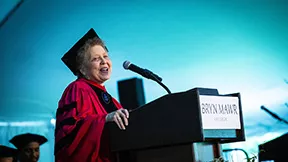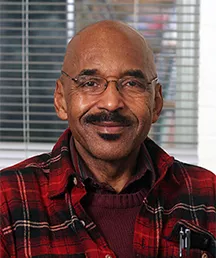A Celebration of Two Storied Careers
Sociology professors Mary Osirim and Robert Washington were honored for their contributions to the College.
A grand celebration was held on November 15 in the Great Hall to celebrate the storied careers of sociology professors Mary Osirim and Robert Washington and to wish them well in their respective retirements.
One could fill pages on each with their many achievements and experiences, not the least of which were Washington’s notable appointment as the first full-time African American faculty person at Bryn Mawr and Osirim’s long administrative tenure as dean of graduate studies and provost of the College.
Many friends, family members, former students, faculty, and staff (including emeriti) gathered to informally swap anecdotes and remembrances of the two scholars. Guests hailed from all points of the country (as far south as New Orleans and as far west as L.A.), some traveled from Canada, and still others came from as far away as Africa.
The formal program included a heartwarming introduction by the honorees’ colleague David Karen, who shared with the audience his surprise and delight as a young professor at having landed in an intensely collegial and warm environment with Washington, Osirim, and Emerita Professor Judy Porter at the start of his career; while friends from graduate school regaled Karen with tales of conflict and strife in their home departments, the Bryn Mawr sociology department by contrast was a haven of collaboration and support.
President Kim Cassidy reflected on the many contributions of Osirim and Washington to the College and to scholarship more broadly. Special guest speakers Akosua Adomako Ampofo and Binaifer Nowrojee ’86 added their remarks. Ampofo, president of the African Studies Association of Africa as well as a professor at the University of Ghana, emphasized Osirim’s mentorship of scholars throughout the years, especially women of color. Nowrojee, vice president for organizational transformation at the Open Society Foundations, shared the learnings from Washington in social justice that have shaped and informed her career, as they have so many other of his students throughout the years.
Alumnae lingering well after the formal program to discuss the impact of Osirim and Washington on their lives served as a reminder of what riches we enjoyed as Bryn Mawr undergraduates. Our constant exposure to world-class faculty and role models, devoted equally to honing their scholarship as well as to lifting up the generations to follow them.
Published on: 02/08/2023

